In the Still of the Night Read online
Page 22
To avoid any conflict-of-interests claims, Hayes would have to wait until after the 2002 elections before he began conducting tests that might explain Ronda Reynolds's death. In the meantime, he studied the reports, photos, and documents Barb Thompson had sent him.
Initially he found few answers to his questions, only more questions.
CORONER TERRY WILSON would be a hard man for anyone to beat. He was locked into his position as coroner of Lewis County, popular with many of the old guard there, and they pooh-poohed the stories that circulated around Wilson. It was true he never went to the death sites of those who died in his county; he assigned deputy coroners to that often-disturbing facet of his job. Nor did he attend autopsies. He signed the documents that specified cause and manner of death based on his deputies' opinions and those of the mobile forensic pathologists who crisscrossed the state. He was highly visible at charity auctions and social events in Lewis County. When asked for quotes, he invariably turned reporters away.
Tracy Vedder, an investigative reporter for KOMO-TV in Seattle, later presented a shocking half-hour documentary about Wilson. But on the surface, he was a family man with two talented daughters and a very tall son who was a basketball star.
Terry Wilson was the head man in the coroner's office, and the buck should have landed with him--but he never responded to what he called "rumors." Vedder dug deep into some of his past cases and was shocked at what she found.
In one instance, a teenage boy was killed as he walked on railroad tracks in Lewis County. It was a disastrous accident and the victim's body was left--literally in pieces--afterward.
But the coroner's office removed only the largest segments of the boy's body and left many behind. To spare the family, friends went to the tracks and collected the bloodied parts that were still on the railroad tracks.
A middle-aged man suffered a heart attack and an ambulance was sent to transport him to the closest hospital's ER. Unfortunately, he died halfway there. The coroner's office directed the ambulance to return the deceased's body to his home and to leave it there. With the coroner's orders, they placed the body outside the house.
Sometime later, the dead man's son and daughter drove up, only to find their father's body lying on a stretcher next to the driveway. They were, of course, horrified and in shock. They wondered why someone hadn't had the decency to at least carry their deceased father inside and put him in his bed instead of leaving him outside, half clad and all alone.
A highly skilled electronic technician passed away suddenly of a coronary occlusion at home. He had all the myriad tools and sophisticated equipment his career demanded in the house. His body was removed to the morgue, but his relatives discovered that every bit of his electronic equipment was gone--stolen; his home was literally stripped when his family arrived. No one ever said that the coroner's deputies had failed to lock the door behind them--or if they were suspects in the theft. No arrest ensued.
It seemed to be hard to die with dignity in Lewis County.
But Terry Wilson sailed through the November 2002 elections, gathering far more votes than any of those who had filed against him--including Marty Hayes. Only then did Hayes feel free to concentrate on helping Barb Thompson continue investigating her daughter's violent death.
Along with Barb and Jerry Berry, Hayes met with Deputy Bob Bishop on December 29, 2002. Bishop and Berry agreed that they were the only two commissioned officers in the Lewis County Sheriff's Office who believed that Ronda had been murdered.
Although the HITS team said they had never talked to Bishop--or anyone else involved--Bishop shook his head, puzzled. He assured Hayes that he had indeed talked with them about his personal conclusions.
Bishop said that Ronda's right hand was underneath the blanket, and her left hand grasped it tightly. How could they have come to their conclusion, with no photos showing where her right hand was? They believed she had shot herself, ergo her right hand would have had to be on top of the blanket. It was a backward kind of reasoning.
"Where did you see her hands--in relation to the blanket?" Barb asked Bishop.
"She was lying on her side, covered with a blanket. I could only see a small part of one hand--her left. Her right hand was covered by the blanket. I didn't see the gun."
Bishop recalled that the covers had been tucked in neatly on what he learned was Ronda's side of the bed, and the pillow was missing. "It didn't look like the picture you have there," he said. "Ron's side of the bed was more messed up in the photo."
It was Bishop who had noticed the vapor and humidity in the main bathroom of the house--as if someone had taken a shower very recently. And he was sure the strongest smell of incense had come from Jonathan's room.
Bishop said that if Ronda's case should ever be reopened, he would be willing to testify about what he saw, and about his interaction with the HITS detectives.
THE MAN BARB CALLED SKEETER was gone from her life, and she didn't blame him. She was still obsessed with finding Ronda's killer, and every other part of her life took a backseat. Skeeter came to believe that he was only a background person in her life, a dogsitter and an overseer to her horse ranch. Although she hated to admit it, Barb knew it was true. She missed Skeeter, but she knew she couldn't quit until she found the answers Ronda deserved. To this day, she remains close to his daughter Cheri-Lynn.
Barb took care of Gramma Virginia, whose health was fading, and she rejoiced when Freeman graduated with degrees in civil engineering and mathematics from Gonzaga University. They weren't getting enough of her time, either, but Barb knew they understood how much she loved them and that she would be back in their lives one day--hopefully sooner rather than later.
Freeman soon found a good job as a civil engineer in Seattle. He was living in Bellevue, a suburb about fifteen miles to the east of the city, across the Floating Bridge. On June 23, 2003, Freeman was coming home at 11 P.M. from a church function, riding a motorcycle he had just bought. It had been raining and the roads were slick with a combination of oil and rainwater. According to police reports, he'd been going only about twenty-five miles an hour, but as he leaned into a slight curve in the road, the rear wheel went out from under the bike.
He went down, sliding on his back into a curb next to the sidewalk. He was wearing the strongest protective helmet money could by, and yet it cracked on impact.
Freeman's motorcycle was a brand-new model that had a hidden compartment where he carried his ID. But the police didn't know that, and he was, for the moment, "Oscar Doe" as he was loaded into a rescue helicopter and transported to Harborview Hospital.
The young man who was still unidentified was admitted in "very critical" condition.
The Seattle police patrolmen who had responded to the accident had time to search the ruined motorcycle more thoroughly and went through his clothing. They found a Bellevue address and were able to contact Freeman's roommates.
It was 3:30 A.M. when one of the officers reached Barb Thompson. They told her that Freeman had been in an accident, but that they couldn't tell her anything more than he was in "very, very, critical condition," and she needed to call the ER at Harborview Hospital as soon as possible.
It seemed that fate or bad luck or something else was conspiring to rob her of both her children. She didn't think she could bear it if she lost Freeman, too.
Her hand trembled as she punched in the phone number for Harborview. The physician working on Freeman told her that he was in a coma, caused by a traumatic brain injury. His brain had swollen and it was possible he would need surgery to drill holes in his skull that would keep the brain from crushing itself against the calvarium. He also had three broken vertebrae and several broken ribs.
It was touch-and-go whether her son would survive, or what brain damage he might suffer.
Barbara made a few phone calls, and one of her friends immediately offered to make arrangements to find someone to take care of Gramma Virginia. The horses she had in training would be transferred to other tra
iners, and she was assured that her own horses would be cared for, their stalls cleaned. Her home would also be cared for.
"Friends came out of the woodwork so early that morning," Barb remembers. "They took care of everything. One of my neighbors gathered a thousand dollars in cash and another brought over their brand-new car with less than seven hundred miles on it! It was all gassed up and ready to go."
Barb arrived at Harborview Hospital less than four hours after the Seattle police phoned her.
She found Freeman was in a deep coma as she sank into a chair beside his bed. She became aware of the whooshing and beeping sounds of the machines that were monitoring his heartbeat, pulse, blood pressure, the amount of brain swelling, and the pressure from his unyielding skull.
She prayed harder than she had ever prayed before, and Barb had prayed a lot during the prior four and a half years. She wanted her son to live, but she could not ask God for his life if he should come back handicapped by the awful injuries he had suffered. "I asked God to give Freeman back to me whole--or to take him. I knew my son wouldn't want to live a compromised life, and it wasn't fair for me to ask for him to live like that--just because I couldn't let go."
For sixty-nine hours, Freeman lay in his coma. Finally he opened his eyes. Barb could tell he didn't recognize her. Nor could he move his arms and legs or talk.
"Still, during those long hours of coma, every monitor had indicated that all systems were within 'safe limits.' Barely so sometimes, but the doctors were hopeful."
Freeman stayed in Harborview for thirty-four days, and once again Dave Bell was there for Barb. "He was my support, my shoulder--my rock," she says. "When I thought I couldn't go on waiting and hoping, Dave was there."
Members of Freeman's church brought Barb at least two meals a day, every day. All of them took turns preparing food for her, and coming in to sit with her, or to give her some free time away from her watch over her son.
"I was never alone. They took such good care of me."
Freeman himself made a miraculous recovery. His determination and willpower exceeded anything most people could summon. He came home in a wheelchair, but he followed up on physical therapy in Spokane. His mother walked beside him as he regained the health and coordination she had thought he might lose.
And he came all the way back. He returned to work as a civil engineer, bought his own home, and audited classes at Gonzaga University to sharpen his skills.
When his mother needs him, Freeman is there.
ALTHOUGH BARB HAD TAKEN a "sabbatical" from her quest to find Ronda's killer during Freeman's recuperation, she was far from finished. Her files filled with names of people who had known and interacted with Ronda, Ron, his sons, and his ex-wife Katie, and she became knowledgeable about the workings of the law. Both Jerry Berry and Marty Hayes were solid members of her investigative team, and she was definitely a thorn in the side of the original sheriff's investigators, who had expected she would drop away after testing them years earlier.
They had had no idea how obstinate and dedicated mothers could be.
One thing Barb had learned in the now five and a half years since Ronda died was that the old saying that "it's always darkest just before the dawn" was true. Every time she thought she couldn't keep fighting, something happened to tell her she had to. Another dawn came.
Barb had set up a website (www.JusticeforRonda.com) honoring Ronda, asking for information. In it there was a brief explanation of the still-open case and photographs of Ronda going back to when she was a pixie-faced toddler and continuing to a picture of Ronda in her Washington state trooper's uniform, proudly receiving her insignia from the governor. The website helped Barb feel hopeful, especially when she received a flood of mail from those who supported her cause. There were scores of posters who believed her and remembered Ronda as a lovely, happy young woman.
And then Barb saw that someone had posted a message sent at 2:38 A.M. on Friday, June 25, 2004. The sender was one of the last people she expected to hear from: Katie Huttula.
It is produced below exactly as it was posted on the Justice for Ronda website, including Katie's misspelling of Ronda's name as "Rhonda":
dear Barb, I only tonight was made aware of this page. I have had no idea how your work on Rhonda's case has advanced. I want to go on record as saying, I personally do not believe that Rhonda killed herself. I believe she was murdered. I do not know who, how or why but I believe her killer(s) should be found and prosecuted to the full extent of the law; whomever that person[s] may be.
I have no other information than that which I have told both you Barb and the authorities.
I loved Rhonda. I know that me being in Toledo after her tragic death was not appropriate. I in no way was trying to produce more deep hurt, to her mother, by giving you the poem. It was my only way of expressing how I felt. Rhonda's death was tragic . . . I am alive. I am basically alone.
That is my cross to bare [sic.] My mental illness and past addiction with resulting crimes of the past are also part of that cross.
My fourty [sic] five year sister killed herself on Thanksgiving this year.
My wonderful parents are still alive and I am very very close to them. I know from a daughter's standpoint how important a mother is. I do not know how I will go on if their death(s) occur before mine.
I wanted to responed [sic] personally to your note.
Sincerely,
Catherine
What did Katie mean in her strange post? She "knew" Ronda had been murdered, and she hinted that more than one person had been involved in killing her, but she disavowed any knowledge of who the guilty person or persons might be. She certainly sounded depressed--far more than Ronda ever had.
Was Katie Huttula's website post a cry for help, asking for sympathy, or did she really know something about Ronda's death and was sending hints to follow up?
Or maybe this was just another cog in a giant wheel that no one could turn smoothly?
When Barb Thompson tried to follow up, she couldn't locate Katie Huttula.
BARB THOMPSON HAD TRIED numerous times to meet with Coroner Terry Wilson over the eight years since Ronda died, but he had always refused to speak with her. Finally, on March 24, 2006, he agreed to a meeting in his office in Chehalis. Accompanied by Larry Semanko, the retired Lewis County deputy and former deputy coroner who was also the husband of Ron Reynold's sister Judy, Barb at last faced the man who was responsible for declaring the manner of her daughter's death.
Carmen Brunton, the current deputy coroner and the staff member who went to the scene of Ronda's shooting, also attended this meeting.
"Why did you put my daughter's time of death at five A.M.?" Barb asked Wilson.
"That was determined by her husband's statement that he was with her until five A.M.," Wilson answered.
"Did you consider anything else?"
Terry Wilson said he had also studied Dr. Selove's autopsy report and Ron Reynolds's statement. That was all.
She asked the coroner about the section on the death certificate for "Interval between onset and death."
"You wrote 'minutes,' " Barb asked. "Why was that?"
He had no recall of why he'd done that.
She asked Wilson to review a report submitted by neurosurgeon Dr. John Demakas that suggested that it would have taken between thirty and sixty minutes for Ronda's heart to pump out the amount of blood found on and around her body.
"After reading this," she began, "would you change the interval from 'minutes' to 'thirty to sixty minutes'?"
He shook his head. "That could mean two minutes or could mean sixty minutes. I see no reason to change it."
Barb asked for another change. Given the patterns of dual lividity on Ronda's body--which would take hours--would Wilson consider changing time of death to range of 1:30 A.M. to 3 A.M.? Or even from 1:30 A.M. to 5 A.M.?
No, he would not. "If I did that, it would be saying that Ron Reynolds murdered her. I can't do that."
That
answer shook Barb. Why should Ron be exempt from tightly focused attention? Should a coroner hold back information to protect "a person of interest"?
"No, it wouldn't mean that," she argued with the coroner. "It would only mean that Ron was lying about the last time he saw Ronda alive."
Barb felt she was making no headway at all. She asked Wilson if he would still say Ronda was a suicide after he read the information she had brought for him to read.
Terry Wilson said he would go through it, but it would probably take several weeks.
Six weeks later, Deputy Coroner Carmen Brunton called Barb and told her that while Wilson had reviewed her evidence, he'd found no reason to change his documentation.
"How--and why--is he still making the determination of suicide?" Barb asked, her voice tight with extreme frustration.
"He didn't say," Carmen said, and hung up.
BY EARLY SUMMER 2006, Barb Thompson, Jerry Berry, and Marty Hayes had reached an impasse. They needed an attorney--a criminal defense attorney--who knew his craft. But such lawyers were expensive, and Barb had few funds available. Neither Jerry nor Marty had charged her for their hundreds of hours of work trying to vindicate Ronda and save her from being inaccurately listed as a suicide.
Marty had an idea. He knew an attorney who might just be willing to take on the challenge, even knowing there would be little cash incentive.
"I'll call him," Hayes told Barb. "All he can do is say no. His name is Royce Ferguson, and he's good. I'll tell him that you sent a letter to Terry Wilson in May where you threatened him with a judicial review."
Ferguson met with Hayes and the two men went out for pizza. Barb, Jerry, and Marty needed to have a judicial review--if they could pull it off--to spark any further action in Ronda's case, now eight years old. If they succeeded, it would be a landmark case, which is why Marty Hayes suspected Royce Ferguson might want to take it on.

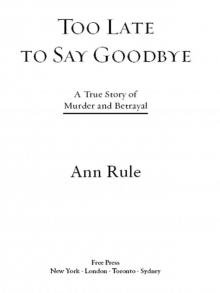 Too Late to Say Goodbye: A True Story of Murder and Betrayal
Too Late to Say Goodbye: A True Story of Murder and Betrayal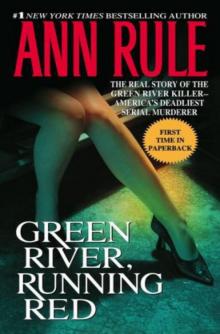 Green River, Running Red
Green River, Running Red Bitter Harvest
Bitter Harvest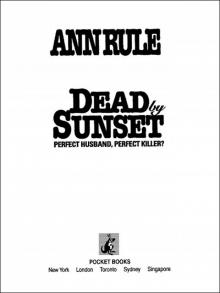 Dead by Sunset: Perfect Husband, Perfect Killer?
Dead by Sunset: Perfect Husband, Perfect Killer?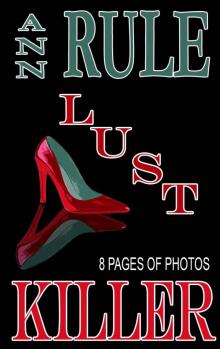 Lust Killer
Lust Killer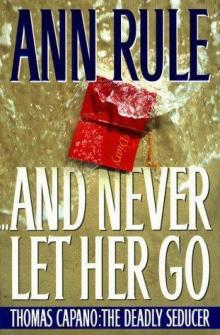 And Never Let Her Go: Thomas Capano: The Deadly Seducer
And Never Let Her Go: Thomas Capano: The Deadly Seducer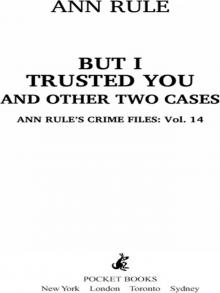 But I Trusted You and Other True Cases
But I Trusted You and Other True Cases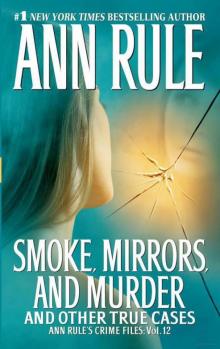 Smoke, Mirrors, and Murder and Other True Cases
Smoke, Mirrors, and Murder and Other True Cases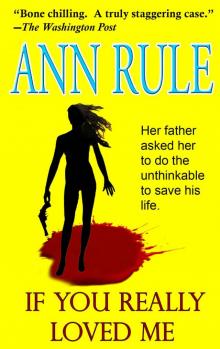 If You Really Loved Me
If You Really Loved Me Kiss Me, Kill Me and Other True Cases
Kiss Me, Kill Me and Other True Cases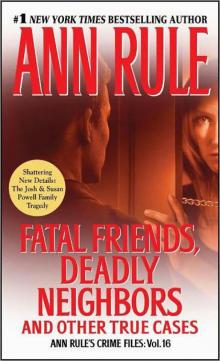 Fatal Friends, Deadly Neighbors and Other True Cases
Fatal Friends, Deadly Neighbors and Other True Cases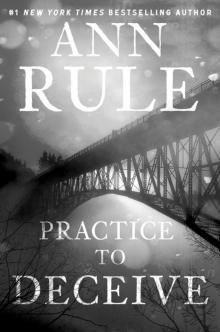 Practice to Deceive
Practice to Deceive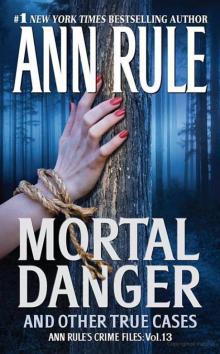 Mortal Danger and Other True Cases
Mortal Danger and Other True Cases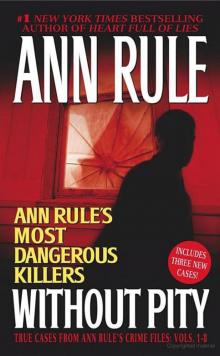 Without Pity: Ann Rule's Most Dangerous Killers
Without Pity: Ann Rule's Most Dangerous Killers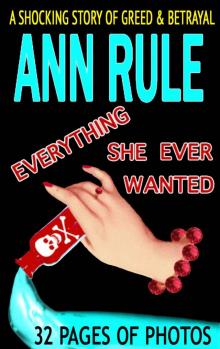 Everything She Ever Wanted
Everything She Ever Wanted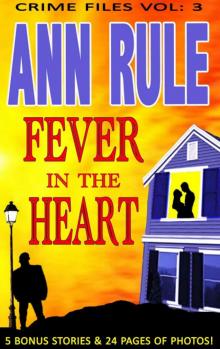 A Fever in the Heart and Other True Cases
A Fever in the Heart and Other True Cases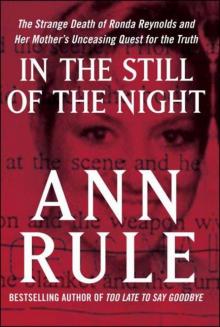 In the Still of the Night
In the Still of the Night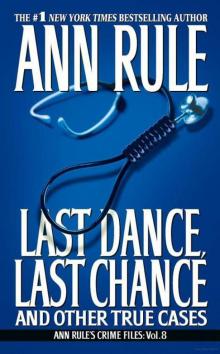 LAST DANCE, LAST CHANCE - and Other True Cases
LAST DANCE, LAST CHANCE - and Other True Cases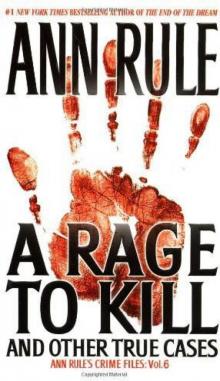 A Rage to Kill
A Rage to Kill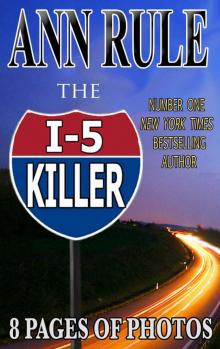 The I-5 Killer
The I-5 Killer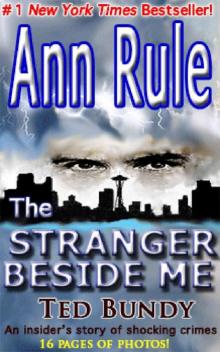 The Stranger Beside Me
The Stranger Beside Me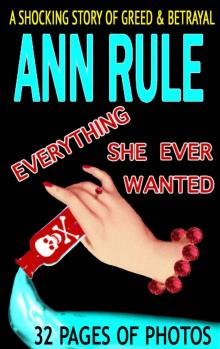 Everything She Ever Wanted: A True Story of Obsessive Love, Murder, and Betrayal
Everything She Ever Wanted: A True Story of Obsessive Love, Murder, and Betrayal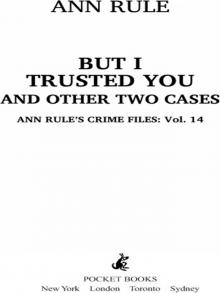 But I Trusted You
But I Trusted You Without Pity
Without Pity Kiss Me, Kill Me
Kiss Me, Kill Me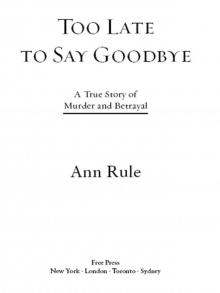 Too Late to Say Goodbye
Too Late to Say Goodbye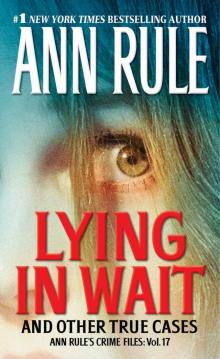 Lying in Wait
Lying in Wait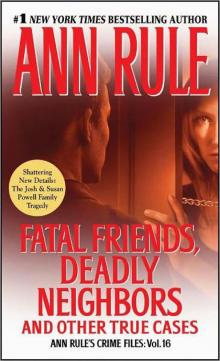 Fatal Friends, Deadly Neighbors
Fatal Friends, Deadly Neighbors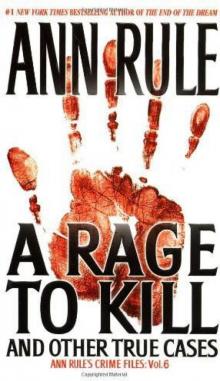 A Rage to Kill: And Other True Cases
A Rage to Kill: And Other True Cases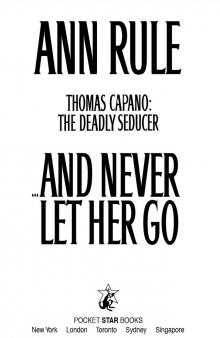 And Never Let Her Go
And Never Let Her Go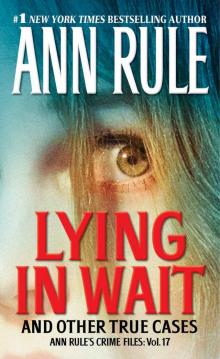 Lying in Wait Ann Rule's Crime Files Vol.17
Lying in Wait Ann Rule's Crime Files Vol.17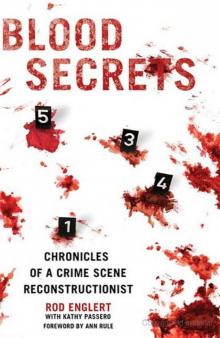 Blood Secrets: Chronicles of a Crime Scene Reconstructionist
Blood Secrets: Chronicles of a Crime Scene Reconstructionist No Regrets
No Regrets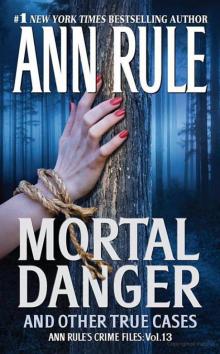 Mortal Danger
Mortal Danger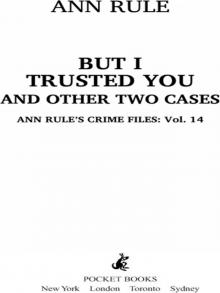 But I Trusted You: Ann Rule's Crime Files #14
But I Trusted You: Ann Rule's Crime Files #14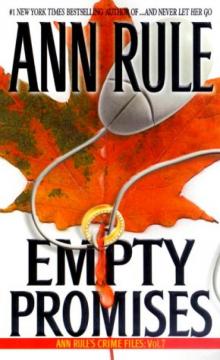 Empty Promises
Empty Promises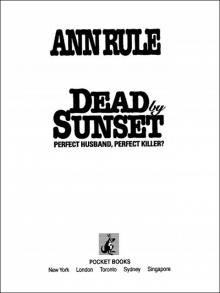 Dead by Sunset
Dead by Sunset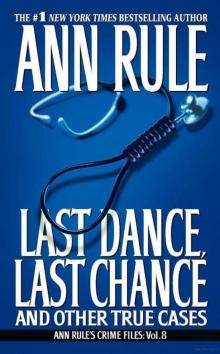 Last Dance, Last Chance
Last Dance, Last Chance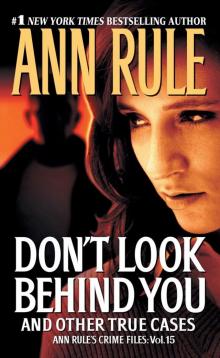 Don't Look Behind You
Don't Look Behind You